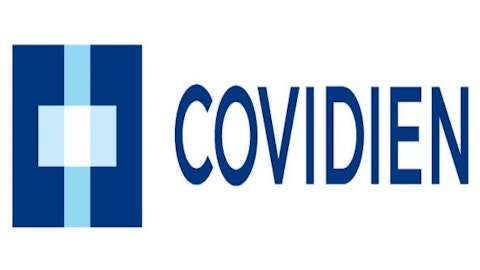Dublin-based pharmaceutical and medical device company Covidien plc (NYSE:COV) recently announced that it had authorized a share buyback program that could be worth up to $2 billion. This announcement comes just a few months after the company boosted its dividend by more than 15 percent and issued several quarters of solid earnings. To make matters even more interesting, the company appears to be nearing the completion of its long-awaited spin-off of Mallinckrodt Pharmaceuticals (MKG – not yet listed).

Taken together, these factors appear to make a convincing case for Covidien plc (NYSE:COV)’s short-term performance. Despite exhibiting market-beating performance thus far this year, Covidien plc (NYSE:COV) is perennially overlooked in favor of larger and more “popular” medical firms like Pfizer Inc. (NYSE:PFE) and Medtronic, Inc. (NYSE:MDT) . If the company can translate these positive signs into lasting momentum for its stock, those who take long positions in Covidien plc (NYSE:COV) at these levels could be handsomely rewarded.
About Covidien
Covidien is a diversified manufacturer and distributor of various medical devices and products that can be used in institutional and private settings. It specializes in producing devices that can be used during surgery, including surgical staplers, vessel-sealing products, and laproscopic equipment for minimally invasive procedures. Covidien plc (NYSE:COV)also makes a number of tissue repair and wound care products and devices. Separately, Covidien plc (NYSE:COV) engages in a number of pharmaceutical development operations and currently spends about 4 percent of its gross revenues on research. Its signature pharmaceutical products include various pain relief drugs and imaging agents. Covidien earned $1.9 billion on gross 2012 revenues of about $12 billion.
Competitors
It goes without saying that the pharmaceutical and medical device industries are frighteningly competitive. Covidien has several major pharmaceutical competitors, including companies like Pfizer Inc. (NYSE:PFE) and Merck (MRK). Like Covidien, Pfizer Inc. (NYSE:PFE) engages in the development of a variety of pharmaceutical products. Since it focuses specifically on drugs and drug delivery systems, Pfizer Inc. (NYSE:PFE) may be better positioned to compete in this market. However, it has been widely reported that the company faces a “patent cliff” and will need to work to replenish its development pipeline. With revenues of around $59 billion, Pfizer Inc. (NYSE:PFE) is several times larger than Covidien.
Covidien also competes with medical device manufacturers like Medtronic. Many of Medtronic’s most important devices deal with various cardiovascular issues, including arrhythmia, heart failure, fibrillation and other problems. The company also produces devices that are designed to combat kidney failure and other renal issues. Medtronic is one of the world’s largest providers of musculoskeletal therapy devices and surgical aids. With revenues of around $16.5 billion, Medtronic is roughly the same size as Covidien.
How the Deal Is Structured
Covidien has authorized the controlled repurchase of up to $2 billion of its own shares on the open market. At the company’s current share price of roughly $68, this program’s full realization would result in the buyback of as many as 30 million Covidien shares. Relative to the company’s total float of about 470 million shares, this would result in the cancellation of roughly 6 percent of its outstanding shares. Although some market-watchers argue that the move has already been priced into the company’s shares, such a move has the potential to boost Covidien’s stock by an additional 5 to 10 percent from its current levels.
Complications and Caveats
Market-watchers have reacted to past Covidien buybacks with skepticism. Indeed, the company does have a history of authorizing share buyback programs and subsequently failing to take meaningful action on them. However, it is too early to say whether that will be the case in this situation. Under the circumstances, it would be foolish for investors to assume a negative outcome. The downside risks of doing so may be significant.
However, it is possible that other aspects of Covidien’s performance will serve to detract from any positive buyback-related effects. For instance, the company could report an unforeseen charge related to the impending Mallinckrodt spin-off or badly miss an earnings target to the downside. Investors who do not feel strongly about Covidien’s underlying strength should not be swayed by this move.
Long-Term Industry Outlook and Possible Plays
Going forward, Covidien clearly seeks to position itself as a principal player in the medical device and wound care sub-industries. With its spin-off of Mallinckrodt, it has divorced itself from much of the costly research and development work that it once conducted in order to focus on more stable streams of revenue. In the long run, this is liable to produce substantial rewards for long-term investors. Indeed, Covidien’s recent dividend boost might be the first sign that its out-year strategy is working.
Of course, the medical device industry is just as competitive as the pharmaceutical industry. Investors must perform their own due diligence to determine Covidien’s worth as an investment vehicle.
In sum, Covidien’s latest share buyback program is an encouraging sign that the company’s growth strategy remains intact. Once it has completed the Mallinckrodt spin-off, Covidien will be free to focus on building up its core operations and returning additional cash to its shareholders. As such, investors would do well to look at the stock at these levels.
The article Buybacks Could Keep Up This Stock’s Momentum originally appeared on Fool.com and is written by Mike Thiessen.
Copyright © 1995 – 2013 The Motley Fool, LLC. All rights reserved. The Motley Fool has a disclosure policy.

